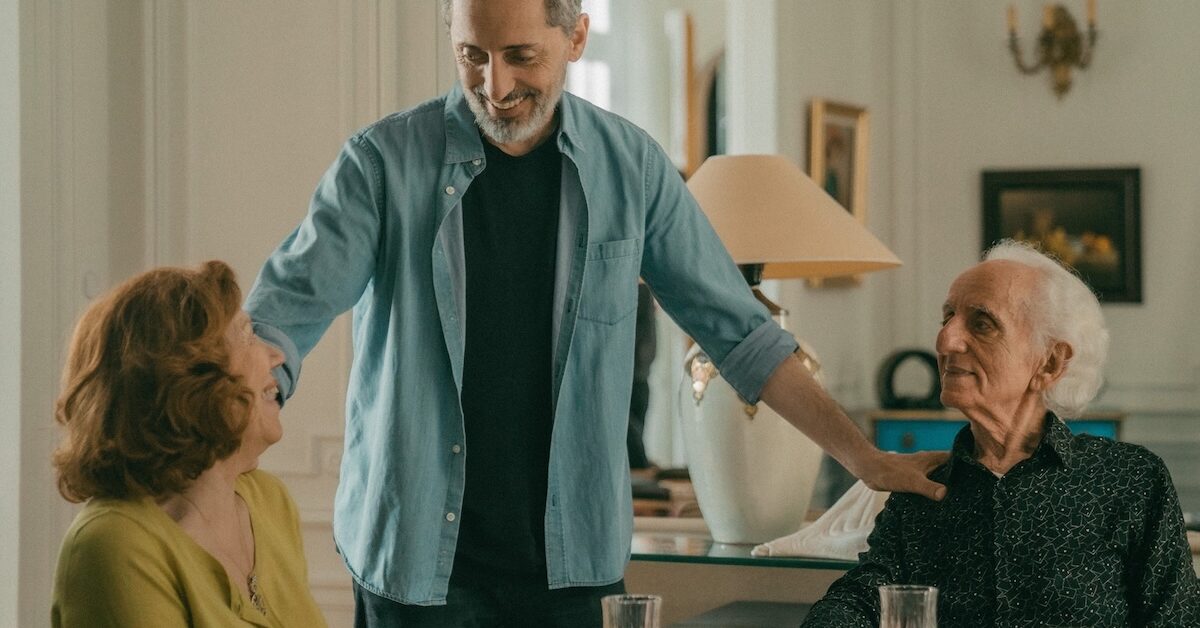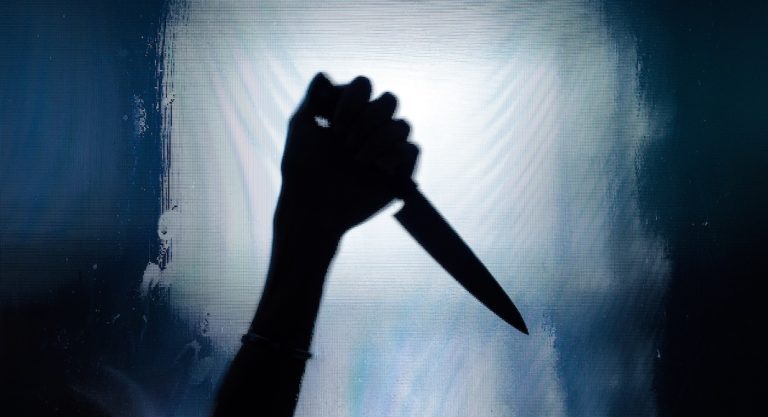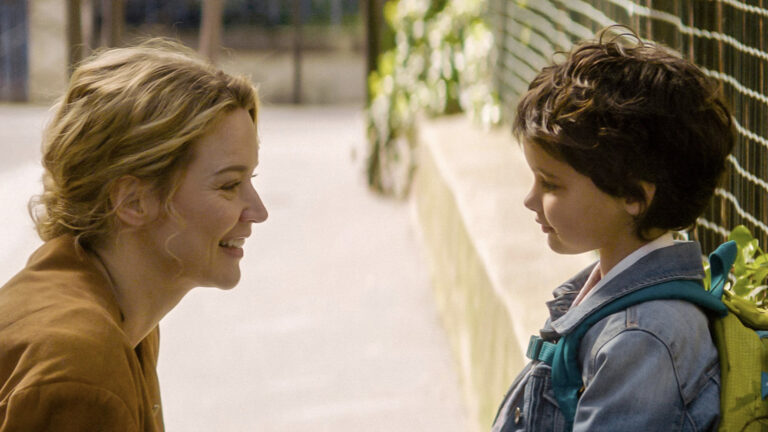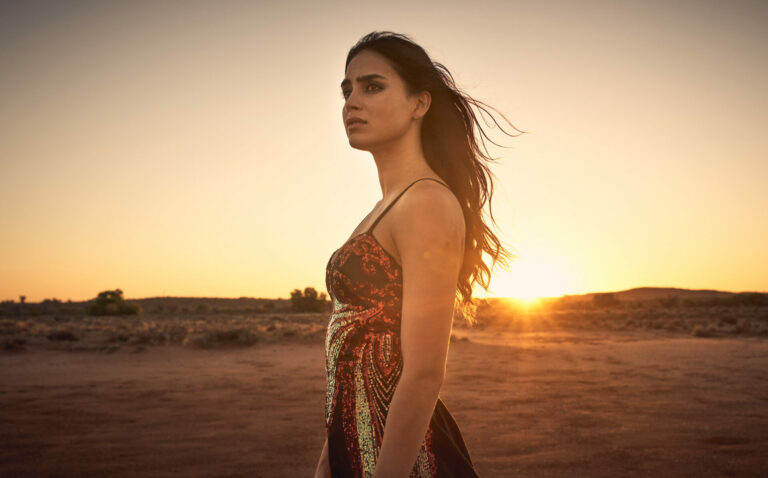Gad Elmaleh fans might be surprised to learn that the comedian, actor, and director’s latest film portrays a serious deep dive into faith and his own relationship to God. In Stay with Us, which he co-wrote and directed, Elmaleh plays his most naturalistic role yet. That is, as his himself: bearded, vulnerable, seeking. And, of course, a stand-up comedian named Gad, who’s been living in the States and returns to Paris to convert from Judaism to Catholicism. He’s been considering the conversion for years, following a childhood obsession with the Virgin Mary. In Paris, he meets with his Catholic advisors, excited to complete his spiritual journey. That is, until his Jewish parents, played by Elmaleh’s actual parents, Régine and David Elmaleh, find the Christian icon in his luggage and flip, throwing Gad into a panic. He suddenly feels pressured to choose between the Catholic church and his own family.
This might sound like the setup for a joke from one of Elmaleh’s comedy routines or the goofy, high-concept films he’s famous for like Coco, Coucou, and The Valet, or his comical, semi-autobiographical Netflix series Huge in France. But Stay with Us takes Gad’s quest extremely seriously. It’s also a seriously thought-provoking and moving film. Faced with his parents’ disapproval, Gad seeks the council of religious figures both Jewish and Catholic, leading to a series of soul-searching, wise, and inspirational conversations. Of course, there are funny moments, like when he makes a list of conversion cons: hurt my parents, betray my community, never work with Spielberg again (Gad voiced Ben Salaad in The Adventures of Tintin)and pros: eternal salvation of the soul. But it’s clear that the Gad onscreen is in crisis.
When I spoke to Elmaleh over Zoom, we debated whether to conduct our interview in French, since his English has gotten rusty. I’d watched some of his hilarious standup in English and found his mastery of the language impressive. “I’m gonna say your English is better than my French right now,” I told him, and he shot back, “Standup doesn’t count,” because it’s scripted and he practices it over and over. Even so, he was willing to cave, admitting he enjoys practicing his English—especially while discussing his new film and his real-life crush on the Virgin Mary.
Gad Elmaleh on (Not Quite) Losing His Religion

The film is based on your life, but it’s not a documentary. How much is autobiographical and how much is fiction?
I know Americans love numbers and percentages, but I don’t want to give numbers. I will say the trigger, le point de départ, is based on a true story. When I was child, I wanted to go into churches. I was born and raised in Morocco, an Arab Muslim country, and raised in a Jewish Sephardic family that wasn’t religious or Orthodox, but pretty observant. They were very strict about that, that I should not even go into a church. That’s the real story: I went into the church and I was fascinated by the Virgin Mary. But I never tried to get baptized.
When your parents wouldn’t let you enter, was part of the appeal for you that it was forbidden?
Totally. When you say to a five-year-old, “Don’t ever go in there,” especially if you don’t know what’s in there, there’s only one thing he wants to do: Go in there. Otherwise he’s not a professional kid. He’s an amateur.
Your producer, Isaac Sharry, has said your original pitch was a love story about your crush on the Virgin Mary. Are you still in love with her?
Honestly, the original version of the script was about a character whose name was Joseph. He was a writer, he lived in New York City, and he writes a book about his love story with the Virgin Mary. When I gave it to the producer and screenwriter, they both said, “Are you kidding us? Really? A writer who goes blah blah blah? It’s you! It’s your story! For many years you told us about your crush on the Virgin Mary, but you made it into a joke. Let’s tell the real story.” And I said, “Okay, I’ll play myself. I’ll play Gad, who goes through this existential crisis.”

You cast your actual parents and sister to play themselves and shot the movie in their homes in Paris. Why that decision and how did you convince them to do it?
It all came together very naturally. I wanted it to look realistic and I wanted to talk to my parents about these issues, see them act with me and my sister. All the characters in the movie are real people. They play themselves. There’s a Muslim who gets converted in the movie. That’s his real story. The rabbis are real rabbis, my real rabbi, who I studied the Torah with, and the nun is a real sister in the community. When we shot [the movie] in the church where there’s a mass, it’s real. I like that. I feel good energy make a movie like that.
There are funny moments—you can’t help yourself—but this is a serious, very intimate and personal film about faith, your relationship to God and, ultimately, your deep love for and devotion to your family. It is a different tone for you.
I know it’s tricky to talk about Woody Allen these days, but I still love him as a director. The kind of comedy he does about serious and emotional topics still manages to be funny. I’m not comparing myself to him, but he’s an inspiration for me. It’s not just gags and jokes, it always means something. The more I talk to you right now, the more I want to do more about this subject, maybe… a trilogy? It would be so interesting to do the next one in Jerusalem, especially now with all the tragedy. We could talk about faith and peace and connecting with people.
For you, what is this film about? What’s your message to the audience?
It’s a message about fraternity. It’s about being deeply free in your own faith and religion. The path of this character is not that he changes his life, but that he takes a detour. No matter what you do, you always return because that’s your DNA, that’s what you are. Taking a detour doesn’t make you another person, it makes you more open, stronger. I think this detour into Christianity made me a stronger Jew.

Was shooting the film an emotional experience?
Yes. To be honest, sometimes on set, my parents would sense that this story was not only fun, that I was not just doing something fictional. I would sense some sadness in their eyes. They were happy to do the movie, but sometimes it seemed to them that it wasn’t a joke, and I think they were sad. My mom improvised this line, “If you change your God, change your family. Get adopted.” Oh my God, she said this! It wasn’t in the script. So, sometimes it was emotional for me. But the good part was simply to go to my parents’ house every day and spend 6, 7, 8 hours hanging out, shooting my mom cooking for an hour. We had a small crew. My mom would cook. She didn’t want anyone to do her makeup. It was such a nice mix of the personal and professional.

Your parents were terrific. Your mom is such a good actress, and your dad is so lovable.
They’re amazing. My mom is so funny. We have a ceremony that’s kind of like the French Oscars, les Césars, and she said, “I’m really wondering why I wasn’t nominated.” I said, “Mom, I love you so much because so many actresses would think this but never say it. And you said it.”
The film has real suspense. We hold our breath wondering if you’ll convert or not—and wondering how that will affect your family, whom we grow to love.
I was really happy to work with Benjamin Charbit. He’s an amazing screenwriter, and, to be really honest, he’s the one who made the story become a movie. He was the one who created the buildup to this tension. We get emotional about family, because we know them a bit and we don’t want them to suffer. There’s one shot a lot of people talk to me about: In it, there’s no dialogue. It’s just a simple shot of my dad at the door of the church. I have some friends who cried when they saw that.
What’s your wish for the film now that it’s out in the world?
That it creates dialogue, and, more specifically, that it creates dialogue about conversion. I want to talk about it because it’s real and some people are not allowed to do it. In some countries it’s forbidden. I think people should be free to explore their relationship to God. A lot of rabbis were against the movie and said, “We have to boycott it.” But this one rabbi said, “Of course I can’t say that what he’s doing is good as a Jew or not. Who are we to judge his relationship to God? It’s very personal, and what’s important is what is in your heart.”
Stay With Us premieres on May 10 in New York, with additional markets to follow.
Andrea Meyer has written creative treatments for commercial directors, a sex & the movies column for IFC, and a horror screenplay for MGM. Her first novel, Room for Love (St. Martin’s Press) is a romantic comedy based on an article she wrote for the New York Post, for which she pretended to look for a roommate as a ploy to meet men. A long-time film and entertainment journalist and former indieWIRE editor, Andrea has interviewed more actors and directors than she can remember. Her articles and essays have appeared in such publications as Elle, Glamour, Variety, Time Out NY, and the Boston Globe.






